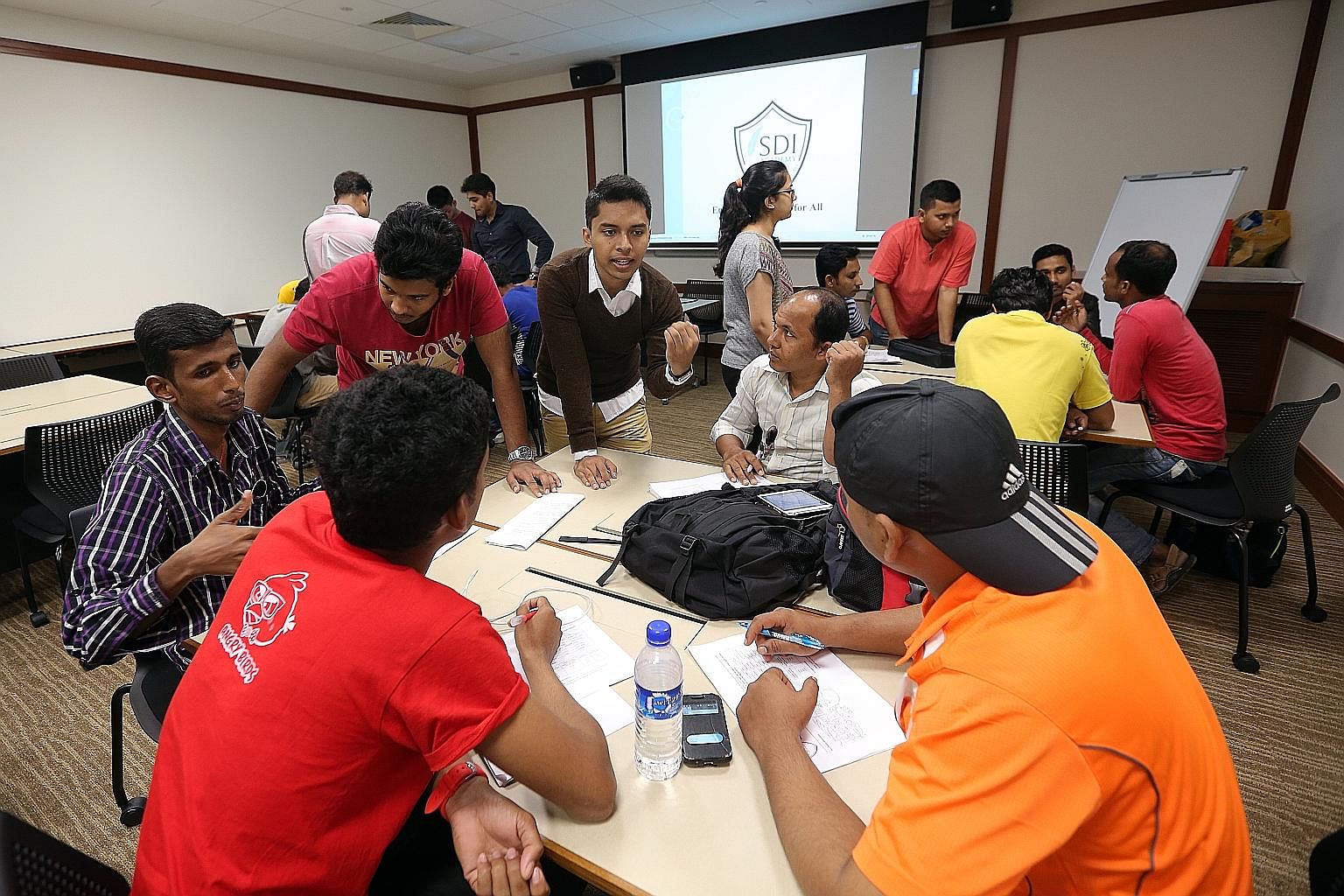Youth on a mission to ease foreign workers' woes
Right after secondary school, he began giving English lessons so they can grasp safety rules
Sign up now: Get tips on how to help your child succeed

Mr Sazzad Hossain (left, in brown sweater and white shirt), 21, came up with his own English curriculum and eventually set up a social enterprise academy to teach foreign workers the language here.
ST PHOTO: NEO XIAOBIN
Janice Tai
Follow topic:
To make the world "suck" less.
That is Sazzad Hossain's motto in life. Though the young adult articulates his vision comfortably in colloquial slang, he is trying to achieve it by teaching foreign workers how to speak proper English.
Mr Sazzad, 21, grew up hanging out with foreign workers. He lived in Lakeside near several dormitories. Their interactions started in his secondary school days with their requests for help with directions.
As he got to know them better, he began dropping by their dorms to chit-chat and, through these conversations, he realised they were struggling in Singapore because of their poor command of English.
"They don't understand safety briefings or instructions and end up with many workplace injuries.
"And when they go to the doctors, they don't know how to describe the pain or how they are feeling," said Mr Sazzad, who graduated from St Andrew's Junior College last year.
He recalled going to hospital four years ago to visit a technician who suffered a serious injury while fixing an air-conditioner.
"He told me he had placed his bare hand over the cylinder to stop a leak; it got burnt and had to be amputated," said Mr Sazzad.
It turned out there had been a briefing before the assignment but he could not understand parts of it.
Mr Sazzad realised how serious the problem was and wanted to do something about it. He could relate to their woes as he, too, had struggled with the language when he moved to Singapore from Bangladesh at the age of 11.
Though he was of age for Primary 6 then, he had to attend Primary 4 classes because he failed the English admission tests.
"I realised the loss of these two precious years was nothing compared to the life and death issues that the workers may face because they don't understand what is going on," he said.
So, fresh out of secondary school, he started conducting English classes for three migrant workers from a bench at Taman Jurong Green Park using his primary school textbooks.
Word got around and soon there was no space on the bench. The workers enjoyed the lessons because they were free and conducted in their native language of Bengali.
"For more to benefit, I knew I needed a proper place and have a proper curriculum," said Mr Sazzad.
He decided to stop lessons for eight months and used the time to look through about 150 language textbooks bought here and from Bangladesh.
He went to speak to workers and managers from the construction, shipping and manufacturing industries to determine common areas of miscommunication.
He then developed his own course worksheets by using concepts from the textbooks and contextualised them by including practical information that the workers would need at work.
He also managed to rent a room in Taman Jurong Community Club and restarted lessons while juggling his studies as a year one junior college student.
He registered his project as a social enterprise and called it the Social Development Initiative (SDI) Academy.
During the year-end school holidays, he spent sleepless nights writing, and published his own book for the workers. It was meant as supplementary material for them to revise outside of classes.
As a student, funds were tight and he had to resort to using his school printer to print the class worksheets.
But things got better later when he started getting government grants and winning pitches in business competitions.
His lectures and group activities for the foreign workers are now held every Sunday at the Yale-NUS campus in Clementi, and the venue is rent-free.
Construction worker Mujahidul Islam, 29, said brushing up his English has helped him converse better with colleagues and other locals.
"When I first came to Singapore, I couldn't understand instructions and brought a spade when I was asked to bring a hammer.
"Instances like these wasted a lot of my time and caused much trouble for me but now, it is much easier for me to work with others," said Mr Islam, who started taking lessons last year and is now attending an advanced English course with the academy.
Mr Sazzad has since hired two other full-time teachers and has two more Yale-NUS students, Ms Valerie Pang and Mr Manas Punhani, both 21, to help him run the outfit.
To keep the social enterprise financially sustainable, he charges each worker $58 a month for the four-month course.
He is reaching out to their employers to get them to sponsor the lessons and to use their premises for weekday lessons.
Next year, SDI Academy will launch classes on Saturdays and start classes for other groups of foreign workers by hiring teachers who can teach English by using Mandarin, Bahasa Indonesia and Tamil. Course materials will also be translated into those languages.
To date, about 300 workers have graduated from the courses.
With all the work that went into the making of SDI Academy, Mr Sazzad's studies took a hit.
Though he declined to reveal what his A level grades were, they were not good enough for him to fulfil his childhood dream of becoming a doctor.
"I wanted to be a doctor because I wanted to make a difference in people's lives," he said. "I took a different route that came with sacrifices but I see my purpose in the big picture and understand that I am also impacting lives now. If I had to choose, I would do this all over again."
•For more information, go to SDI Academy's website


